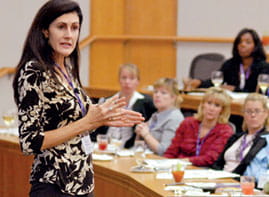Jan Eberly is back
The U.S. Treasury’s chief economist returns to teach macroeconomic policy at Kellogg
By J. Alan Brennan6/26/2013 - In the midst of the country’s worst financial crisis in decades, Professor Jan Eberly served two years as assistant secretary for economic policy and chief economist of the U.S. Department of the Treasury. There, she managed a team of 30 macro- and micro-economists, analyzing and advising on policies to address key issues, including employment, healthcare, housing and education. Having recently returned to Kellogg, Eberly talks about lessons learned and how she plans to apply them to her research and in the classroom.
Kellogg: What was the most interesting policy you worked on?
Jan Eberly: The policy world is pretty rich now. Following the financial crisis, there’s been a lot of focus on the housing market. We’ve done a fair amount of work on large issues like refinancing and loan restructuring and loan modification programs to support the improvement in the market. All of it was very satisfying, and you could read the front page of the New York Times and see the issues we were working on. Then, there were other topics that weren’t on the public radar but made a substantive difference for struggling homeowners.
Do you have plans to do follow-up research on any policies you helped implement to see how they fare?
Yes, there’s a number of cases – I think housing is a good example – where there had been research but the market changed so much that there are many new questions as well as old questions that need to be reexamined with new data. Having worked on it from a policy level, I would be interested to do research in that area. Also, credit policy is very interesting to me. Obviously, credit played a big role in the housing boom and housing collapse, but there are credit issues beyond housing as well, particularly in monetary and budget policy.
Was there a lot of pressure in this position, given the state of the economy?
The pressure was more internally generated. The team at Treasury, and my team in particular, was a highly energetic and effective group of professionals drawn from business, academia, law and finance. When the world is in need of the best thinking in economics and you have leadership that’s eager to hear ideas and to implement the best of them, there’s so much good that can be done. There was opportunity for thinking ahead and anticipating issues—and there were many cases we were pretty effective at doing that—but there were also cases in which we were just reacting. It was that internal pressure that drove us to provide the absolute best ideas, analysis and advice in policy development that we could in either situation.
That sounds exhilarating and exhausting. Would you recommend it?
That’s a good way to put it. I think most people go into these jobs because they have a desire to serve the public and they know the position has a finite life, so they’re able to exert so much mental and physical energy. It’s also really gratifying to put your skills and knowledge to good use. So for academics and others who are considering the opportunity, I would highly recommend it. Public service at this level involves practicing your craft, but in a completely different environment. It’s a good career and perspective refresh.
Based on this experience, do you see a need for change in how we educate business leaders?
We shouldn’t underestimate how important a role business leaders can have in economic issues. Many business leaders transcend their primary interest to have a conversation about the national interest and public policy issues. And when they do that, they can be very effective and help shape a conversation about the public good. So as we’re training business leaders, I think preparing people to play that role and give them the tools to think about national economic issues is valuable to the student—but also a public service.
Did the experience change you?
I think it’s given me stronger views on what’s valuable in research and what policy issues are most relevant. I think it also made me a better manager. This was an office large enough that it required affirmative management. In a resource constrained setting, with tight budgets and high-quality people, managing them in a way that they felt valued and that their work was important was challenging but very rewarding. They really are a very talented, dedicated group of public servants.






